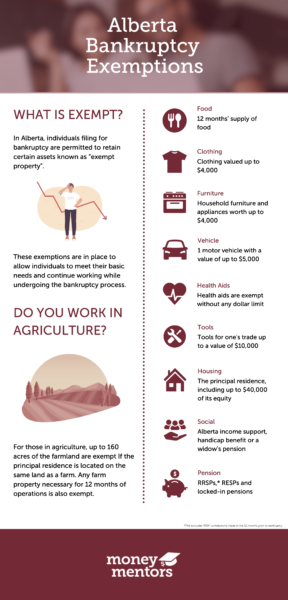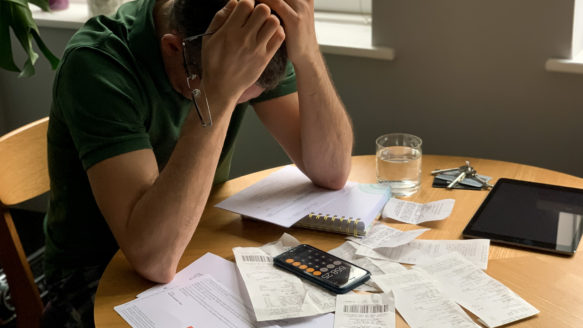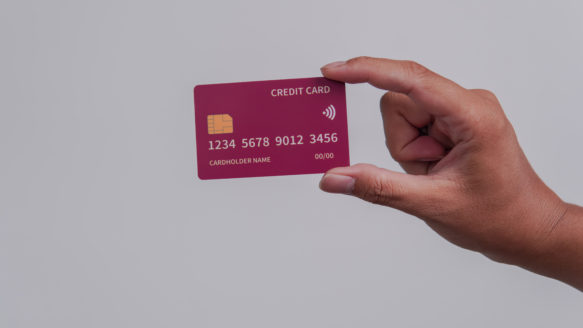
Bankruptcy Alberta: How Bankruptcies Work
We understand that the changing economic landscape in Alberta, driven by rising interest rates, may be causing you money stress and making it harder to repay your debt. If your debt has become unmanageable you may be considering declaring bankruptcy in Alberta. This is a big decision with serious ramifications and it’s important to understand the downside to filing for bankruptcy, as well as alternatives to bankruptcy before finalizing your decision.
In this article, we’re going to cover:
What is Bankruptcy?
What Happens if I File for Bankruptcy in Alberta?
What Can I Keep During a Bankruptcy if I Live in Alberta?
Alberta Bankruptcy Exemptions
What Will I Lose During a Bankruptcy in Alberta?
Will I Lose My House if I File for Bankruptcy
Will I Lose My Car if I File for Bankruptcy
Should I File for Bankruptcy in Alberta?
FAQs
What is Bankruptcy?
Bankruptcy is a legal process to eliminate debt that you can’t pay back. If you cannot repay the money you owe to creditors, you can file for bankruptcy to start fresh, albeit with some consequences.
When thinking about bankruptcy, a proactive approach starts with understanding your finances. Just how deep are you in debt? How long would it take to clear them with your current income? A handy tool to help you get a clearer picture is the Debt Repayment Calculator. It will give you insights into your financial outlook and whether bankruptcy is indeed a road you should travel.
What Happens If I File for Bankruptcy in Alberta?
The process of filing for bankruptcy in Alberta may initially appear complex, but we’re here to help break it down into manageable steps for you.
It’s important that we clear up a common misconception regarding bankruptcies. Many people believe that you don’t pay anything in a bankruptcy and that your debts are simply wiped out with no upfront costs. While “no-fee” bankruptcies are an option through the Bankruptcy Assistance Program for those on low income, others will usually be expected to pay around $200/month in fees to a Licensed Insolvency Trustee (LIT) to manage the bankruptcy.
When you declare personal bankruptcy, you agree to hand over certain non-exempt assets to a LIT, who will manage them to pay off your debts. In Alberta, some assets are protected from bankruptcy, such as your home (up to $40,000 equity and depending on your mortgage arrangements), car, RRSPs (depending on when you contributed), locked-in pension plans, and some household items. It varies from case to case, so it’s best to consult a professional to understand what assets you can keep.
Once you file for bankruptcy, your creditors must stop trying to contact you, and most legal proceedings and garnishments related to your debts will come to a halt. This protection is known as a “stay of proceedings.” You’ll get a break from wage garnishments, lawsuits, and other actions by unsecured creditors.
After your bankruptcy paperwork is filed with the Office of the Superintendent of Bankruptcy, your Trustee will notify all of your creditors within five days. This way, they can start the process of filing their claims. Your Trustee will also handle any outstanding tax returns up to the date of bankruptcy and will include any outstanding balances or penalties in your bankruptcy filing.
Once you’ve filed for bankruptcy, you’ll usually have certain responsibilities, like providing monthly income statements and attending credit counseling sessions to help you avoid future financial difficulties.
When your bankruptcy is discharged (usually in nine or 21 months for first-time filers), your included debts will be wiped out. However, a record of your bankruptcy will stay on your credit report for approximately six years from the discharge date. Once your bankruptcy is discharged, you can start working on rebuilding your credit.
What Can I Keep During a Bankruptcy if I Live in Alberta?
Individuals filing for bankruptcy while living in Alberta are permitted to retain certain assets known as “exempt property”. These exemptions are in place to allow individuals to meet their basic needs and continue working while undergoing the bankruptcy process.
Have questions?
Need more information or want to talk to a certified financial counsellor for peace of mind? Let us help.
Call 1-888-294-0076 or fill out this form to speak with a certified financial counsellor. It’s free for all Albertans.
Alberta Bankruptcy Exemptions
It’s important to point out that these exemptions are based on liquidation value, not replacement value. For example, if you needed to liquidate all of your furniture at a garage sale, you would likely get $4000 or less but if you were to replace it all it could be over $20,000.

Under Alberta’s bankruptcy exemption rules, a person can keep the following:
- 12 months’ supply of food
- Clothing valued up to $4,000
- Household furniture and appliances worth up to $4,000
- 1 motor vehicle with a value of up to $5,000
- Health aids are exempt without any dollar limit
- Tools used for one’s trade can be kept up to a value of $10,000
- The principal residence, including up to $40,000 of its equity, is exempt, with the amount reduced proportionally if the residence is co-owned.
- Alberta income support, handicap benefit or a widow’s pension as long as the proceeds from the payment are separate from your other funds
- RRSPs*, RESPs and locked-in pensions
*RRSP contributions in the 12 months prior to your bankruptcy are not exempt.
For those in agriculture, up to 160 acres of the farmland are exempt If the principal residence is located on the same land as a farm. Any farm property necessary for 12 months of operations is also exempt.
What Will I Lose During a Bankruptcy in Alberta?
It is important to understand that no two bankruptcies are the same, and the assets you may lose during a bankruptcy in Alberta will depend on your specific circumstances and the value of your assets compared to the exempt amounts set by the province.
A good way to get a general understanding of the assets you may lose during an Alberta bankruptcy is to use the exemptions listed above in a process of deduction. In other words, any assets you own with a value greater than what is listed above may be lost during bankruptcy proceedings in Alberta. If you do have assets that have excess value and/or income above the exempt amount, that excess value gets paid to the estate and is distributed to creditors to pay down some of the debt. Depending on your situation, those payments could be quite high.
For example, if you own multiple vehicles, or have substantial equity in your home (more than $40,000), you may stand to lose a lot from declaring bankruptcy. In a situation such as this, it may be a good idea to consider some alternatives to bankruptcy such as the Orderly Payment of Debts program or a consumer proposal.
Will I Lose My House if I File for Bankruptcy?
The question of whether you will lose your house when you file for bankruptcy in Alberta depends on several factors. In Alberta, your principal residence (the place you live most of the time) is among the assets that may be subject to liquidation in a bankruptcy, but there are specific exemptions. You can be exempt from up to $40,000 of equity in your home, and if you co-own your home, this exemption is reduced to your share. If your home is mortgaged, only the equity is subject to seizure in a bankruptcy. If your equity is below the $40,000 threshold, you might be able to keep your home if you can continue making payments.
Will I Lose My Car if I File for Bankruptcy?
If you file for bankruptcy in Alberta, whether or not you can keep your car depends on multiple elements. One of these is the exemption limit set by the province. Alberta’s bankruptcy exemption rules allow you to keep one motor vehicle with a value or equity of up to $5,000, especially if your car is essential for your job.
You can keep your car if:
- You are making monthly payments to your trustee on time
- Your car has less than $5,000 equity
- You are able to make payments on your car
You can’t keep your car if:
- Your car has more than $5,000 equity
For example, if you took out a car loan for $10,000 and you have already paid $6,000 towards what you owe then your car may be seized to pay what you owe towards your debt in your bankruptcy claim. If you are behind on payments, discuss this with the Trustee to learn the best options.
So, Should I File for Bankruptcy in Alberta?
Filing for bankruptcy in Alberta is a significant decision that requires careful consideration of both the advantages and potential repercussions. While bankruptcy can provide a fresh financial start by eliminating your debts, it also comes with consequences that may affect your assets, credit score, and overall financial stability. It’s essential to understand the process and implications of filing for bankruptcy and to explore alternative solutions that may better suit your situation. One such alternative is the Orderly Payment of Debts (OPD) program, which allows you to consolidate and repay your debts over time under court supervision, at a fixed interest rate of 5%. Booking a free consultation with an unbiased credit counsellor at Money Mentors can provide you with valuable insights into your financial situation, potential exemptions, and alternative debt relief options, such as the OPD program.
In the end, the right approach is the one that offers you a pathway to a more secure and sustainable financial future while considering your specific needs and circumstances. Remember, you are not alone in this journey, and support is available to help you make informed decisions and navigate the road ahead.
Frequently Asked Questions
How do I file for bankruptcy in Alberta?
To declare bankruptcy in Alberta, you need to work with a Licensed Insolvency Trustee who will help you understand your financial situation, assess your debts, and guide you through the bankruptcy process, including the preparation and filing of the required documents.
What are the downsides to filing for bankruptcy?
Filing for bankruptcy can have several downsides, including the potential loss of non-exempt assets, a negative impact on your credit score for several years, difficulty securing future loans or credit, and a sense of personal and financial stigma. Learn more about the circumstances when filing for bankruptcy might not be your best option.
What are the benefits of filing for bankruptcy?
The benefits of filing for bankruptcy include immediate relief from creditor harassment, the elimination of most unsecured debts, a halt to wage garnishments and legal proceedings related to your debts, and the opportunity for a fresh financial start.
Have questions?
Need more information or want to talk to a certified financial counsellor for peace of mind? Let us help.
Call 1-888-294-0076 or fill out this form to speak with a certified financial counsellor. It’s free for all Albertans.








